Any list of the best of anything created within the year that the “anything” was created is nothing more than a snapshot in time. Films age. Some decay, and some become more significant as the years go by. Couple that with the fact that it’s nearly impossible to see everything in the day and age of streaming and theatrical releases; well, the whole commission is full of folly. But folly, I must, because lists are more than anything great conversation starters and can often shine a light on films that might have otherwise been overlooked.
Speaking of films I missed before the deadline that I would consider definite contenders otherwise, I could not fit in Maria with Angelina Jolie and A Complete Unknown with Timothee Chalamet taking on the enigma of Bob Dylan.
Alas, the show must go on. Before I get to my top ten, please allow me to indulge in a group of terrific films that fell just short of my final list.
My honorable mentions are:
Horizon: Kevin Costner’s epic take on the move west. No film this year was more under-appreciated by critics and audience members than Costner’s old-school yet forward-thinking Western. Intended to be the first of four installments, Horizon Saga 1 delivers more than given credit for and promises even more.
Good Girl Jane: Flat out the best young girl in trouble film since Catherine Hardwicke’s Thirteen from way back in 2003. Director Sarah Elizabeth Mintz and lead Rain Spencer are ones to watch.
The Featherweight: Robert Kolodny’s faux documentary about an over-the-hill Willie Pep and his misguided desire to return to the boxing ring is one of the most inventive films of the year. James Madio, as the real-life Pep, gives a stunning performance as a man forever stuck between worlds.
Nickel Boys: Director RaMell Ross’s inventive look at two friends trying to survive a brutal reform school is one of the year’s most challenging and beautiful films.
The Brutalist: A near masterpiece that is beautifully shot and acted, but also, at times, too much of an endurance test. Adrien Brody is top-notch as an architect whose involvement with a wealthy family (headed by a never-better Guy Pearce) leads to great suffering. As brilliant as director Brady Corbet’s film often is, it is also exhausting. I’m no hater of three-hour films (Oppenheimer, JFK, and Godfathers I and II are among my favorites), but the use of that time matters most. For my money (and time), the film’s entire epilogue could have been cut, and nothing would have been lost. Still, Corbet is so gifted that it’s hard not to believe he will put it all together one day.
The Black Sea: Directed by and starring Derrick B. Harden, The Black Sea is about a wayward barista who, on a lark, ends up in Eastern Europe and starts a restaurant with a local entrepreneur (a spellcasting Irmena Chichikova) out of necessity when his passport is stolen. The Black Sea feels smallish while you’re watching it, but lingers in the heart and mind long past the rolling of the credits.
A Real Pain: Jesse Eisenberg’s second film as a director stars him and Kieran Culkin as frenemy cousins who travel to Poland to uncover their Jewish roots. Both actors are in fine form as they navigate their love/hate relationship, and the final shot of Culkin in close-up at an airport is one for the ages.
Nightbitch: A movie in which an overwhelmed mother may just be turning into a dog is a brilliant satire about the loneliness of the stay-at-home mom. Director Marielle Heller’s dark (but frequently and awkwardly) amusing satire has no business working, but Heller’s management of tone and Adams’ brilliant performance bring the film home with real panache.
Rebel Ridge: Director Jeremy Saulnier’s thriller about a former Marine (Aaron Pierce in a breakout performance) trying to bail out his cousin but runs into a hayseed sheriff (Don Johnson, who is aging quite nicely) whose recalcitrant racist ways force Pierce into an impossible situation is the surprise thriller of the year. Rebel Ridge didn’t need to be as sharp and thoughtful as it is to be entertaining, but it is, and no film seemed to drop from the sky (Netflix doing Netflix things) and provide a more surprising and engaging action film than Saulnier’s Rebel Ridge.
Saturday Night: With a real “let’s put on a show” energy that sustains the film from the first second to the last, no movie from this year was more entertaining and yet dismissively reviewed than Jason Reitman’s brilliant ensemble film about SNL’s opening night. Lamorne Morris’s throwaway scene as the real-life Garrett Morris performing a soundcheck to a song about getting a shotgun and killing all the “whiteys” possible may have been the single funniest moment of the film year.
Furiosa: Perhaps no film underwhelmed at the box office in 2024 than George Miller’s gonzo Mad Max universe prequel Furiosa. A rip-roaring mad bastard ride starring Anya Taylor Joy (as Charlize Theron’s younger self) was a ride on the lunatic fringe of filmmaking, and the moment Joy shaves her head and drops her voice an octave, it’s as if she and Theron became one in that moment. The film’s box office failure may have robbed us of another peek into the wasteland, but if so, this was one hell of a way to go out.
September 5: The unkindest cut of all, September 5, dramatizes the kidnapping and murders of Israeli athletes during the 1972 Olympic Games in Munich. While this is a well-documented tragedy, the story has never been told from the perspective of the ABC sports crew, who were there to cover sports, not a terrorist event. September 5 is one of the year’s most efficient and thrilling movies. A film that seems to be moving in “real-time” even though the actual events took place over several hours. John Magaro, Peter Sarsgaard, and Ben Chaplin headline a terrific ensemble, but Leonie Benesch is the scene-stealer here as a German translator who understands Hebrew. As a German citizen, it is she who best speaks to the horror of the victims being Jews in the country responsible for the Holocaust, and she does so without ever raising her voice.
Okay, now let’s move on to the serious business and brutality of narrowing down an entire year of film into ten pieces.

10…The Sinking of the Lisbon Maru: One of the two most obscure choices of my ten, The Sinking of the Lisbon Maru, tells the true-life story of British POWS being transported to Japan during World War II to be placed in hard labor camps. A U.S. sub unknowingly torpedoes the ally-filled vessel, leading to over 1,100 deaths due to Japanese soldiers boarding up the holds where the POWs are being kept and shooting at those who break through the wood barriers and make it into the water. From there, what happens can accurately be described as Hong Kong’s “Dunkirk” as Chinese fishing boats enter the water and pull many a POW onto their small sea crafts and row them to safety. I don’t know what’s more extraordinary about the story: the fact that it happened or that so few know about it. The Sinking of the Lisbon Maru is a masterful film directed by first-timer Fang Li. However, despite winning multiple awards and receiving glowing reviews, at publication time, the film is still seeking international distribution. This is the best documentary I’ve seen all year and a film worth clamoring for.

9…Anora: Sean Baker’s latest look at a life lived on the margin isn’t just his best film, it’s also his most purely entertaining. Baker’s editing has sometimes struck me as a bit hyper and his scripts overly loose (I say this as someone who has liked, to one degree or another, every film he has made), but the (no longer) secret weapon at the center of the film, Ani/Anora, played by Mikey Madison is so engaging, sexy, and real that any resistance to Baker’s excesses are futile. And there are excesses. As Ani is swept up in a whirlwind romance with the son (Ivan) of a Russian oligarch, their brief but intense union is interrupted when her new husband’s (yes, they get married—Vegas style) family finds out about the boy’s newlywed status to a sex worker (Ani is a stripper and at least occasionally a prostitute). The film threatens to run out of steam over the last thirty to forty minutes as the Oligarch’s henchmen rush from location to location with Ani in tow to track down Ivan and force an annulment. As the travelogue wears on, the film threatens to go off the rails, but the final moments save it as Ani sees how close she came to a life of luxury and how far a drop it is to the place she will return to. Madison is an absolute wonder as Ani. Her thick Brooklyn accent and brash demeanor could have come off as cartoonish, but Madison never fails to expose at least a glimmer of the vulnerability that lies just beneath her mask of a smile.
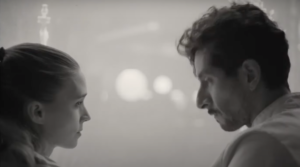
8…La Cocina: Winner of the Heartland Film Festival’s Audience Award, La Cocina is the most anxiety-inducing restaurant drama on film (giving TV’s The Bear a serious run for its place settings). The film takes place all in one day at a restaurant run by a malevolent owner who uses a mix of undocumented labor and paycheck-to-paycheck locals to prep and serve meals at a location that is surely a dead end. While the film is a true ensemble, the first among equals is the great Rooney Mara, playing a waitress having an affair with an undocumented line cook (Raul Briones, who deserves to be a star) living and loving on a knife’s edge as they decide what do about her unintended pregnancy. Beautifully shot in black and white, the film’s vision is clear-eyed and stark. The road to nowhere begins and ends in “the kitchen.
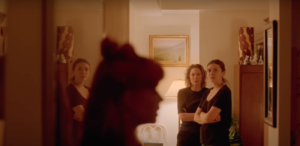
7…His Three Daughters: This strangely unheralded film featuring a three-way tour de force of performances by Carrie Coon, Elizabeth Olsen, and Natasha Lyonne was dropped into rotation months ago by Netflix as if it were one of those six-year-old films that no one saw in theaters and the streamer advertises as a “new release.” The actresses at the center of Azazael Jacobs’ tale of three very different sisters making an often in-vain attempt to manage their father’s inevitable demise with an unusually blunt hospice employee (a drily and darkly hysterical Rudy Galvin) are all brilliant. Coon and Lyonne often seem on the verge of fisticuffs, whereas an exhausted Olsen is stuck playing referee, at one point bracing herself in a doorway to keep them apart. His Three Daughters isn’t all acrimony, though. By the film’s end, an uneasy truce is reached as the three women set aside their differences to deal with one of the most painful subjects in life: the slow death of a loved one. If I’m making the film sound overly dark, it is pretty dark, but it’s often uproariously funny, especially when a first among-equals Lyonne lets her foul mouth rip. I’ve heard some say that His Three Daughters sometimes feels more like a play than a movie. While I understand that argument to a degree (the film primarily takes place inside a small New York apartment), Jacobs’ elegant camera movement convincingly pushes back against that idea. His Three Daughters feels like a film still waiting to be discovered. I would suggest that if you haven’t seen it, make the time. You still have a chance to say you got there early when this film starts appearing regularly as one of the best of the decade in the years to come.
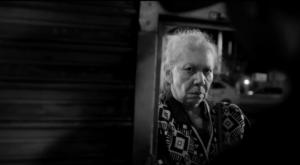
6…We Shall Not Be Moved: Another film that largely takes place in a small apartment, this one in Mexico as an aging and ailing councilor discovers the military officer she believes tortured and murdered her brother in 1968, just before Mexico City hosted the Summer Olympics. In what may be the best performance of the year, Luisa Huertas plays Socorro, the long-grieving sister who will stop at nothing to settle the score. Socorro is not an easy character to warm up to. Her sister lives with her, but they haven’t spoken in years despite sharing less than a thousand square feet of space. She loves her son but doesn’t hide her disappointment with his inability to support himself and his wife while lazing about in her high-rise apartment with a broken elevator. Almost all of Socorro’s sweetness is saved for her daughter-in-law (the radiant Agustina Quinci), best showcased in a sequence where the two drink and smoke to the great disapproval of the jobless man of the house. Eventually, Socorro’s obsession costs her nearly everything, and while first-time director Pierre Saint-Martin’s lustrous black and white film takes a slow burn into the thriller portion of the picture, even then, his remarkable film upends expectations. We Shall Not Be Moved won the Best Narrative Award at the Virginia Film Festival and is now playing theatrically in France. I’m sure it will eventually hit a streaming service near you sometime in 2025. Make a note, you won’t want to miss it.

5…Better Man: Look, if you’re going to see one movie all year about a British pop star who never had a hit in the United States and is played on camera by a CGI chimpanzee, make sure it’s this one. Seriously though, Director Michael Gracey’s musical biopic of the biggest British pop star of the ‘90s, Robbie Williams, is a one-of-a-kind experience. And no, I’m not kidding; while human actors play all the other parts in the film, Williams is played by a “performing monkey,” and not only is it brilliant fun, but Better Man is also surprisingly moving as it traces the duality of Williams’ excessive ego and childlike fragility. This film has no business working. Hell, I can’t figure out how it got made, but in a year with such daring musicals as Emilia Perez and Wicked, Williams’ and Gracey’s singing, dancing chimpanzee steals the “break into song” mantle from those two more heralded releases. It’s also the only film I saw all year where I took a screenshot of a singing chimp, sent it to my wife, and asked her to confirm that I wasn’t hallucinating. I wasn’t.
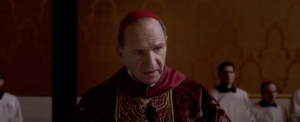
4…Conclave: You would be correct if you were to suggest that the two institutions I hold the least interest in are the papacy and the royal family. However, like Cate Blanchett’s magnificent Elizabeth from 1998, Conclave plays like a political thriller (minus Elizabeth’s bloodshed). Ralph Fiennes tortured Cardinal Lawrence must head up a conclave to decide who among them would be the next pope. Not only does Lawrence not want to be the pope, but he is so full of doubt that he’s not even sure he should head the conclave itself. Conclave is in the tradition of films like 12 Angry Men, JFK, or Oppenheimer (at least to a degree) that are largely about men standing around in quiet rooms talking. Just talking. But like those three classics, director Edward Berger makes conversation thrilling because every word matters. The men involved are politicking for themselves or others to lead an entire religion forward (or back). The atheist in me could put up no resistance. Berger’s last film was the first German adaptation of All Quiet on the Western Front. With that masterwork and Conclave back-to-back, Berger has announced himself as a major filmmaker whose next movie should be met with great expectations. Still, I can’t end discussing Conclave without speaking to the extraordinary work of Ralph Fiennes—an actor who is so relentlessly excellent yet somehow taken for granted. Fiennes has scored just two Oscar nominations in the entirety of his career, and his last nod came over thirty years ago for The English Patient. I will eat my hat if the Academy passes over Fiennes this time. He makes the simple act of returning a turtle to safe waters feel like the most important thing a person could do. Being an act of mercy, maybe it is.

3…Civil War: No film stole my breath quite like Alex Garland’s brutal fourth feature film about what happens when a country loses more than its stability but much of its humanity too. Ostensibly about a crew of four journalists (led by an outstanding Kirsten Dunst) setting aside notions of morality to cover the breaking apart of the United States of America. Garland’s film has been criticized for not taking a firm political stance (although the acting president’s constitution-violating, misinformation-delivering persona will likely remind you of someone in particular). There is not a single mention of Democrats or Republicans in the film. One might see this as a cop-out, and I understand those arguments, but the sense I took from the movie is that the war has been going on so long that those fighting it either no longer remember what they are fighting for or no longer care. The film is about what happens when societal guardrails are ripped from the ground and the sky is set afire. Who are we then? Most movies would focus on those who find the better angels of their nature. With rare exceptions, Civil War is interested in our devils.
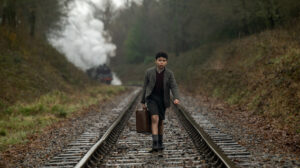
2…Blitz: Steve McQueen’s latest has been overlooked by nearly every critics group and awards givers. Reviews of the film are overall favorable but modestly so. The most common complaint I’ve heard is that for a McQueen film, it’s a rather conventional effort—an assertion that should boggle many a mind. Taking place in 1940 London when Nazi bombardiers were unleashing hell from above, McQueen takes a deceptively simple storyline: that of a boy trying to make it home after getting separated from his mother, and with brushstrokes of Dickens and Homer illuminates the plight of not only the whole of London but more specifically that of its immigrants (predominantly those from the West Indies). During the Second World War, we have been consistently told that the Brits united as one. Blitz shows us a much more complex view of that period. While bombs may not discriminate, people (white people) still make the time. If Blitz weren’t so excellent from a filmmaking standpoint, it would still be a novel landmark in cinematic history. Think about it: name a single movie that takes place during World War II in London that has ever shown a person of color. I can’t think of a one. That is, until now. If the only service Blitz delivered was illuminating a part of history that has been hidden from most of us for the entirety of our lives, it would be a film that matters. However, McQueen does so much more than just deliver a history lesson. Blitz is a hero’s story of a boy (newcomer Elliott Heffernan) who overcomes extraordinary obstacles to find his way home. Yet, even at that moment, which might be seen as triumphant, McQueen refuses to take the easy route. For every good thing that happens, a bad thing happens, too. Blitz is a portrait of life out of balance due to the madness of war, and even in those moments when one might want to cheer, the harsh reality of war never fails to show its face, and for the first time in any British war film that I’ve ever seen the human faces aren’t made up of stiff-upper-lipped white folks. Blitz proves that there are millions of stories to be told during London’s resistance to the Germans, and for the first time ever, that story isn’t about the usual suspects.
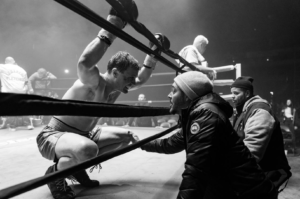
1…Day of the Fight: I’ve been writing about boxing longer than I’ve been writing about film. One might think that my background covering the sport would naturally draw me to films about those men and women who enter the squared circle. While that’s true, my extensive time spent on the sport can make me a harsh judge of films about the sweet science. So many of them follow the same formula. Boxer loses a big fight, comes back, and wins a big fight. There are two things that Day of the Fight is not. It is not formula; more importantly, it’s not a boxing movie but a movie about a boxer. That second distinction is so important when discussing the merits of the film. Yes, there is a “big fight” in the movie, but had that fight never taken place, if you had not seen a single blow thrown in Day of the Fight, you’d still have a complete film. Directed by Jack Huston (of Huston cinematic royalty), Day of the Fight is about what it would mean to know that you may only have one day left to make all your wrongs right, or at least mend them as much as possible. The gifted but oft-troubled Michael Pitt plays Mikey, a former champion who blew up his career and family by playing roulette with the bottle and his car keys one too many times, resulting in a tragedy that not only causes a loss of life but also results in an eight-year prison sentence. Despite his time away from the sport, Mikey’s name carries just enough weight to pull in a favor and get him a matchup on the undercard of a big title fight. Before Mikey can enter the ring, he makes the rounds with his most loved ones before going twelve rounds in the ring. He sees an old supporter (Steve Buscemi), then his best friend who is now a priest (John Magaro), his disabled father (Joe Pesci), a gravestone of no small importance, and most poignantly, his ex-wife (a pitch-perfect Nicolette Robinson) who bore him a child she will not let him see. Day of the Fight is not about winning a match. It’s about letting go of pain and doing your best to reduce the pain you’ve caused others. It’s about finding a measure of peace by giving all of yourself away. It’s about seeing the rain coming down on a sunny day. Other films may win more awards and be rated more highly by critics (although this is the only film I know of to be feted by Martin Scorsese—who once made a pretty good movie about a boxer—with a special screening during the festival/awards season). When the film faded to black, a single word left my lips. I did not speak it by choice. I spoke it because my mouth was just ahead of what my brain was thinking. I didn’t say the word so much as it simply escaped my lips. “Perfect.” That’s what I said. “Perfect.”





![‘Pirates! The Penzance Musical’ Breakout Star Nicholas Barasch Discusses Performing On The Tonys With Seven Stitches On His Face [VIDEO]](https://thecontending.com/wp-content/uploads/2025/06/Pirates0011r-120x86.jpg)



